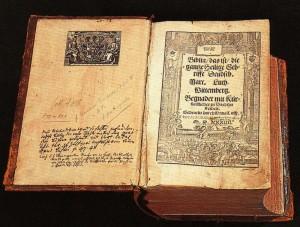For centuries, Latin was the dominant language in what was then known as “Christendom.” It remained dominant for so long for three main reasons:
1) It was an international language for the elites. The elite and literate across Christendom could understand Latin in both its verbal and written forms. This gave the language a feeling of richness, and allowed the elite to maintain a feeling of control over the commoners.
2) Lent the Church authority. Ultimately, the elite of Christendom at the time were the members of the Clergy. All religious works up until the better part of the 15th century were printed strictly in Latin, enforcing the dominant feel of the language over the common people.
3) Thus, it kept the commoners dependent on the Church. As commoners were illiterate, they had to put their full trust in the words and teachings of the Church. They could listen but not necessarily understand, and they certainly could not read it.
This problem, of not being able to understand exactly what they were being taught, was largely tackled by Martin Luther, for Luther saw these reasons behind the continued use of Latin, and recognized that in teaching people something in a Language they did not understand, left the door wide open for corruption.
At the time, Luther was not the only one with this opinion. In fact, the rise of the use of the vernacular was an idea that was slowly encroaching Christendom. The center of this use of vernacular, particularly vernacular printing, was in Augsburg. It makes sense then, that Luther would be the one to largely catapult the movement, as he was a native Augsburgian.
***Click link for video on decline of Latin***
This catapult motion from Luther was his translation of the Greek bible into German, resulting in the Luther Bible. The translation spread rapidly throughout Christendom, creating a stronger demand among forming nations and regions for texts in their own dialects. This first major vernacular text quickly revolutionized printing, damaging the hold of Latin over Christendom and knocking down fully another pillar of the crumbling palace that was “God’s Kingdom.”
Luther Bible:


Leave a response